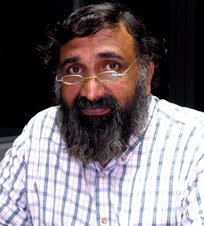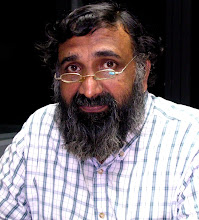
Prof. Eben Moglen, Professor of Law at the Columbia University Law School, General Counsel of the Free Software Foundation, Boston, and Founder and Director-Counsel of the Software Freedom Law Centre, was in India in the first half of June 2007, and in Thiruvananthapuram, Kerala State, during June 4-7. He spoke at the Indian Institute of Information Technology and Management, Kerala (IIITMK), he held discussions with the Kerala State Planning Board, and addressed a publick meeting at Mascot Hotel along with Prof. Prabhat Patnaik, Vice Chairman, Kerala State Planning Board. Given below is a brief report of the public meeting.
The Seminar started at 5:30 and the hall was almost full. Mr. Jyothilal, Secretary of the IT Department, welcomed the gathering.
The first talk was by Prof. Prabhat Patnaik on Innovativeness in Property Relations. He spoke very briefly, but demolished the idea that innovation cannot happen without exclusion. He quoted Schumpeter, a great supporter of capitalism, to show that the concept of private property in ideas goes totally against capitalism. Taking the example of two companies, he showed that the best course for each company will always be to innovate. This is true even without the s-called "Intellectual Property Rights". These rights are in addition to the financial benefits they get from innovation.
Prof. Eben Moglen spoke next. His talk was called Freeing the Mind: Free Software and the Death of Proprietary Culture. But he seems to have departed much from his speech on this topic that can be seen on the Net. He started where Prof. Patnaik left. He said that this was the first time that he has had the government people on his side! His arguments were from the practical point of view which, in a sense, complemented Prof. Patnaik's theoretical analysis.
He said that monopoly rights for the innovator is not an essential pre-requisite for innovation to happen. As an example, he pointed to Free Software itself. He said that we have created software that is better than proprietary ones by any technological criteria. And this happened without any monopoly rights for anyone. He said that the company that has accumulated the highest amount of money has innovated very little. Its word processor, he said, was incapable of producing any good-looking document. He narrated an instance where he was asked by an advocate in the US what he used for creating legal documents for submission to courts. When he replied that he used a software called LaTeX, the other advocate wanted to learn LaTeX. Microsoft did not innovate, they purchased. The application called Word was purchased from the Palo Alto Research Centre of Rank Xerox. The company itself came to prominence because IBM did not want their own software to go
into the PC they designed and manufactured. He said that it is not possible to delve deeply into justifications for capitalism without encountering contradictions.
In his opinion, it was not capitalism that brought wealth to the US, but initiatives that were more socialist than capitalist. Like the free university education given to retired military personnel at public institutes. Another was the high spending in research during to the cold war. He said that steps like these had led to a lot of infrastructure development. Once the cold war ended, and the government started to reduce funding for research, things started changing. Developments in technology, he said, were not cutting at the roots of the structure that crated them. The copyright and patent laws that were supposedly meant to promote innovation were, in fact, slowing them down. Any innovation now involved negotiations with several people who held the rights. Information Technology now makes it possible to make infinite copies of different kinds of software -- programs, music, video, text, and so on -- and this is posing a threat to the companies that were making money from these things. This kind of a situation had been predicted by Marx and Engels, he said, though such technologies could not have been thought of in those days.
Prof. Moglen said that all patent laws, including the ones in the US are archaic. A cost-benefit analysis is done on everything the government does. But no such analysis is done to see whether a patent would do more harm than benefit to society before the patent is granted. In other words, innovation is given infinite weightage. The prevention of software patents would give enormous benefits to society, he said. The human species learned to manipulate the world, to control nature for its own benefit. All this happened because of the large brain and hands that were freed when homo sapiens became bipeds. There is the question of which came first. Modern research shows that man became a biped first and it was later that the brain enlarged. Surprisingly Frederick Engels had stated this two centuries ago. He had said that it was the use of hands for manipulating the
external world and experimenting with it that led to the increase in brain size.
Prof. Moglen said that computer networking had brought about a big change in the way we live. If we switch off the net now, deny the Internet to everyone, a lot of people will find it very difficult to lead a normal life. When a young woman decided to quit myspace, a new community was created to encourage her to come back to the site because she used to be the custodian of all their photographs. The network has changed even the job market.
The market is the central point of focus in economics and it decides how resources are allocated under scarcity. You have the demand curve and the supply curve and things like that to determine what shall be the price of a commodity. You have the fixed cost and the marginal cost and things like that. So you sell a loaf of bread for the marginal cost. But suppose there are people who cannot afford to buy the bread at the marginal cost, it leads to injustice. Suppose you have a machine which requires only one loaf of bread to begin with and you can generate thousands of loaves by just pressing a button. Then the marginal cost becomes zero, and it is unfair to charge for each loaf.
The network has made possible Free Software, which is frictionless at the network. Here, the fixed cost is covered because human beings love to create. The marginal cost is virtually zero. The economist, homunculus economicus, does not see human nature. The reductionist economist went on reducing until he reduced everything, including himself. This economic dwarf considers human beings as individuals. John Donne had said, "No man is." We are not islands. The guy who made Free Software did not do so because he had a monopoly. He did so because he could not have done anything else. This is what makes meaning in, and meaning of, life. People simply enjoy doing things, and one of the best examples for this is Wikipedia. He said that one aspect of Wikipedia is sufficient to demonstrate this -- the breaking news. He said that the breaking news in Wikipedia is better than any other media because people the world over are seeing/hearing news and putting it in Wikipedia. Prof. Moglen said that his blog is often behind Wikipedia when it comes to matters about himself. This is proof of the fact that a proof-of-concept + running code + community leads to production without property. He also mentioned his Correlative Corollary to Faraday's Law. He said that, like in Faraday's Law, take the community, wind the net around it and spin the world, and you get information flowing through the network. We take from people according
to their ability and give to people according to their need.
There were a few questions related to the topic, which were mostly kind of clarifying his statements. The meeting ended around 8 pm.
In the name of progress, big businesses are increasingly restricting our freedom. There is resentment in the United States against the manipulations of the Recording Industry Association and against laws like the Digital Rights Management (DRM), what Richard Stallman calls Digital Restrictions Management. There is apparently a law in India that prevents people from singing popular songs (film or otherwise) before an audience without getting permission from an organisation and paying them in advance. This is absolutely ridiculous and an example of the extent to which commercial interests can go to prevent your freedom -- even your freedom to sing. If we do not react to these challenges to our freedom, tomorrow we may even have to pay to speak in our mother tongue!
Also: Eben Moglen's speech at Bangalore -- Read the transcript here


1 comment:
[url=http://community.bsu.edu/members/buy+online+Viagra.aspx]Viagra non perscription[/url]
[url=http://eterporno.ru/web-sayty-znakomstv.php]web сайты знакомств[/url]
[url=http://eterporno.ru/loveplanet-ru-znakomstva.php]loveplanet ru знакомства[/url]
[url=http://pc.eterporno.ru/zadat-feferu-seks.php]задать феферу секс[/url]
[url=http://pc.eterporno.ru/sereznye-znakomstva-perm.php]серьезные знакомства пермь[/url]
[url=http://pv.eterporno.ru/index.php]самый большой чат знакомств[/url]
[url=http://pv.eterporno.ru/unye-seks-blog.php]юные секс blog[/url]
[url=http://px.eterporno.ru/2-mohnatye-blyadi.php]2 мохнатые бляди[/url]
[url=http://px.eterporno.ru/znakomstva-gorod-buy.php]знакомства город буй[/url]
[url=http://px.eterporno.ru/bdsm-znakomstva.php]Bdsm-знакомства[/url]
[url=http://pz.eterporno.ru/ulichnye-prostitutki-pitera.php]уличные проститутки питера[/url]
[url=http://pz.eterporno.ru/sayt-znakomstva-moskva.php]сайт знакомства Москва[/url]
[url=http://pz.eterporno.ru/blyadi-chelnov.php]бляди челнов[/url]
Post a Comment